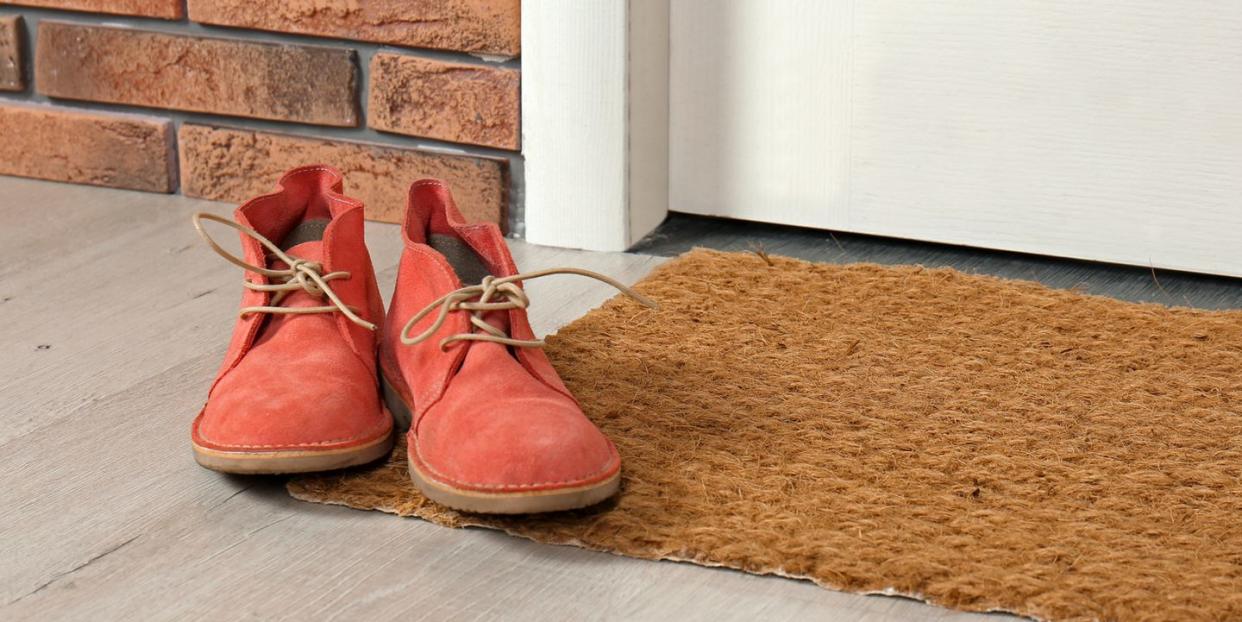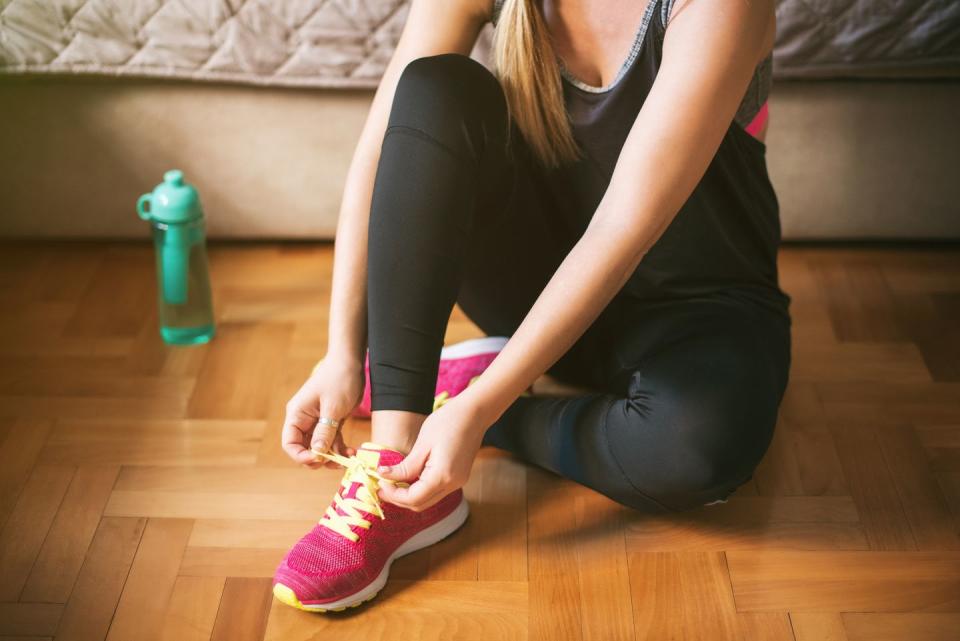Yes, the Coronavirus Can Live on Your Shoes, But Experts Say You Shouldn't Be Too Concerned

We've known that the virus that leads to COVID-19 can live on numerous surfaces for a while: A study published in the New England Journal of Medicine found that the virus will remain viable on plastic surfaces and stainless steel for up to 3 days, and on other surfaces like cardboard for up to 24 hours. And officials at the Centers for Disease Control and Prevention have issued guidelines for cleaning clothes during the pandemic, despite being unable to confirm how long SARS-CoV-2 remains on fabrics, as well as urging people to wash and dry any face coverings they wear in public to avoid germ exposure. But there's one gray area that isn't so clear — what about the shoes we wear outside?
A new study using data collected from a hospital in Wuhan, China suggests that the virus that leads to COVID-19 can collect on the shoes of medical workers — in fact, nearly half of the medical workers surveyed had the virus on their shoes. Published in the journal Emerging Infectious Diseases in April and shared by the CDC, the report was based on swab samples collected between February 19 and March 2 from contaminated objects in hospital wards.
Researchers did conclude that the soles of shoes, in particular, could function as carriers of the disease in a hospital setting, recommending that doctors and other healthcare professionals disinfect their shoes' soles before walking into other wards. "In conducting these tests, [researchers] weren't expecting it on the ground," says Sandra Kesh, M.D., an infectious disease specialist and the deputy medical director at Westmed Medical Group in New York's Tri-State region. "When they swabbed the soles of the shoes, [nearly] half of those samples tested positive, and [researchers] ended up thinking that the medical workers are the ones trekking it around floors... They then started suggesting shoe coverings in hospitals for those who need to walk around."
But should people outside of a hospital setting take the same precautions? And can shoes really pose a threat to otherwise clean interiors? Dr. Kesh and other experts share tips for dealing with shoes during the COVID-19 pandemic in particular, alongside our own Good Housekeeping Institute's advice for keeping your home safe.
Can my shoes collect coronavirus outside?
Theoretically, yes: But Dr. Kesh says it's important to remember just how many other germs our shoes normally come into contact with outside of the house. And it's also crucial to remember that the study was conducted in a hospital setting, where there's a high concentration of very sick individuals who are staying in one place. Dr. Kesh explains that the virus can be transmitted by viral droplets, which would be the main concern for those worried about their shoes.
"People who are symptomatic, especially those in hospitals, are much more likely to spread COVID-19 — after all, the more droplets that you put out into the world, the more likely your risk is going to increase," Dr. Kesh says, adding that when people in hospitals do things like cough, sneeze, or shout, infectious droplets can soar through the air and land on the floor. "While we know that people who are asymptomatic can still shed and spread the infection, what we don't know or have a concrete answer for is how much of the virus is spread by asymptomatic people."
Sidewalks and public spaces are much more likely to have less infection than a hospital floor — as are places like grocery stores or banks. You have to also remember that even if you managed to step directly on an infectious droplet in a public space, you would need to somehow track that particle back home without it wiping off your shoe, and then touch your face, nose, or mouth after touching that particular spot on your shoe. "There's multiple checks and steps that have to happen in order for it to be an infectious risk," Dr. Kesh explains.
If you're truly concerned about your shoes possibly coming into contact with contaminated surfaces, the best thing to do would be to leave shoes you wear outside by your door, Dr. Kesh says. "Leave them outside, or in the entryway, and then have indoor shoes you like to wear or simply go barefoot — problem solved."

How long can coronavirus live on shoes?
Despite the earlier advice published in the New England Journal of Medicine, there hasn't been any singular research or study that clarifies how long the novel coronavirus can live on clothing. But you shouldn't shy away from all of your shoes just yet, because experts say the risk associated with clothing items and shoes may not be as strong as other risk factors.
Lisa Maragakis, M.D., a senior director of infection prevention within the Johns Hopkins Health System, shared that it's much harder for you to contract COVID-19 by touching a soft surface — including your shoes — than other common surfaces like door handles, or worse, by ignoring social distancing suggestions altogether. "So far, evidence suggests that it’s harder to catch the virus from a soft surface (such as fabric) than it is from frequently touched hard surfaces like elevator buttons or door handles,” she wrote.
Beyond current research, a 2005 study of the virus that causes SARS-CoV, another form of coronavirus, suggests that infectious germs took anywhere between five minutes and 24 hours to become inactive on clothing. "Even with a relatively high virus load in the droplet, rapid loss of infectivity was observed for paper and cotton material," researchers wrote.
Clothing or shoes shouldn't be your primary concern — the highest risk of contracting COVID-19 has to do with face-to-face interaction or physical contact. "The virus tends to survive on polished surfaces, but on things like cardboard, which has a corrugated surface, it tends to dry out," Dr. Kesh explains. "The virus needs moisture to survive: With fabric, the moisture is going to be absorbed and the virus is likely going to dry out quickly."
Should I be washing my shoes?
Carolyn Forte, Director of the Good Housekeeping Institute Cleaning Lab, says you can't disinfect a pair of shoes like a solid surface in your home — so don't try to use harsh, stringent cleaners. And don't bother trying to wipe down your soles, either, since shoe soles' aren't always non-porous (especially running shoes), your attempts to disinfect would be just wasting precious wipes. "I think the best advice is to just take your shoes off at the door and leave them there for outside use only," Forte says. "And if you are spot-cleaning or handling dirty shoes, wear gloves and wash your hands afterward."
If the manufacturer's instructions printed within your shoes say they can be machine washed, Forte says you should follow their directions precisely. But most shoes shouldn't go into a machine washer, she clarifies, much less a hot dryer (which can melt or alter certain materials). "Most shoes or sneakers should be hand cleaned and air dried."
As more information about the coronavirus pandemic develops, some of the information in this story may have changed since it was last updated. For the most up-to-date information on COVID-19, please visit the online resources provided by the CDC, WHO, and your local public health department. You can work to better protect yourself from COVID-19 by washing your hands, avoiding contact with sick individuals, and sanitizing your home, among other actions.
You Might Also Like

